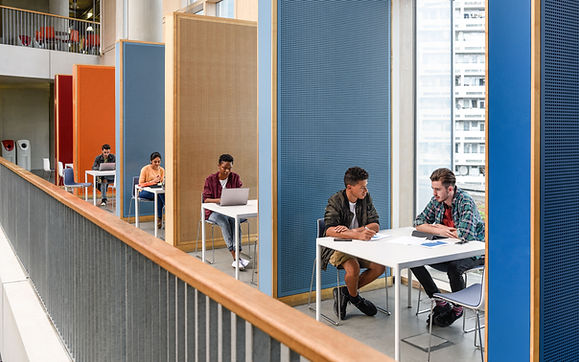
We're co-designers, co-producers and co-consumers of public diplomacy.




SUSTAINABLE DEVELOPMENT DIPLOMACY
The challenge of addressing complex sustainable development issues - including climate change, forest degradation, and food security - have led to the emergence of a new type of diplomacy, known as Sustainable Development Diplomacy (SDD).
The Institute has developed the SDD model to spur stakeholder engagement in intergovernmental processes. This model offers an innovative approach to non-state actor participation in international policymaking processes, allowing previously ad-hoc mechanisms for stakeholder engagement in policy development and decision-making to become an accepted method of solutions to key global issues.
This model:
-
offers a unique way for various stakeholders, in particular, under-represented communities and minority groups to work alongside current SDG intergovernmental initiatives,
-
guides non-state actors in aligning their strategies with the SDGs and enhancing their contribution to sustainable development through public diplomacy activities,
-
increases the ability of Sustainable Development Diplomacy practitioners to encourage real and lasting change in their areas of expertise and interest,
-
demonstrates that innovative approaches to stakeholder interaction can be developed, tested, refined and for the public good, without risking the structures and processes of governments.

Who can be a public diplomat?
Our Response: everyone!
Whether you’re a public diplomacy practitioner or student, at the start of your sustainability journey or developing your next set of commitments, we’ve got useful resources to support your contribution to the Global Goals through public diplomacy. You will receive a certificate in recognition of your contribution. Everyone is encouraged to take part, as every contribution counts.
Unleash the potential of diplomacy in SDGs!


Objectives
The 2030 Agenda cannot be achieved without nonstate actors. As these actors work to localize SDGs, opportunities to share best practices and expertise between public diplomacy practitioners and various stakeholders have grown.
Our work on SDD seeks to help non-state actors better exchange knowledge to ensure mutual benefits and co-create multi-level and multi-stakeholder partnerships for more effective SDGs implementation.
We created this digital platform geared toward knowledge circulation among NGOs and academic staff, focusing on three areas:

1
Towards Effective Participation and Representation of Minorities in Negotiating and Implementing Sustainable Development Policies and Practices
Minorities are often uncritically seen as a democratic force in global governance. Non-state actors claim to hold states and intergovernmental institutions accountable and channel the voices of minorities in policy making. The Institute assesses the representation of minorities in global governance, with a focus on the negotiations of the SDGs.
We first analyze how minorities and their local representatives are procedurally included in global civil society (procedural representation).
We then assess minority consultative mechanisms that could be divided into four principal categories, as follows:
-
Co-decision mechanisms
-
Consultation mechanisms
-
Coordination mechanisms
-
Minority Self-Governance Mechanisms.
We then quantitatively and qualitatively assess the actual representation of organizations representing minorities in the civil society hearings of negotiations within international organizations, where civil society representatives were invited to speak on behalf of their local representatives who claim to represent the minorities (geographical representation).
Finally, we evaluate the extent to which these representatives who claim to speak on behalf of the minorities legitimately represented the interests of these people (discursive representation).
We find that global civil society fails to fully represent minorities procedurally, geographically, and discursively, ultimately perpetuating injustices in global governance.
2
Towards Effective Procedures to Ensure the Representation of a Broad Range of Views of Underrepresented Population
Representation of a broad range of views entails communication in languages other than English.
All native and non‐native speakers of English, Spanish and French together only add up to 27 percent of the world population (Eberhard et al., 2020). About three-quarters of the global population have no chance to give any input as they lack the language skills to read the statements or follow the discussions.
The Institut's work is directed to those linguistic groups which are clearly underrepresented in intergovernmental processes relative to their numbers in the global population.
3
Converting Underrepresented Population into Change Agents of the Social, Ecologic and Digital Transformations
Working in cooperation with partners, the Institute promotes a better understanding of intergovernmental processes, with a view to attracting people from diverse backgrounds into public diplomacy and maximizing the accessibility of the subject to members of underrepresented populations.
/

CALL FOR EXPERTS -
Online Certificate Programme
The Institute is looking for EXPERTS to participate in the content creation of a 10-hour content for Online Certificate Programme on “Sustainable tourism diplomacy”.
BUILDING MULTISTAKEHOLDER
PARTNERSHIPS
We aim to build on innovative diplomatic instruments to form multi-stakeholder partnerships towards the effective implementation of intergovernmental processes that contribute to sustainable tourism.
PHONE
644884916
Building Bridges through Tourism Diplomacy:
Sustainable Tourism
The World Tourism Organization defines sustainable tourism as “tourism that takes full account of its current and future economic, social and environmental impacts, addressing the needs of visitors, the industry, the environment and host communities".
In the 2030 Agenda for Sustainable Development SDG target 8.9, aims to “by 2030, devise and implement policies to promote sustainable tourism that creates jobs and promotes local culture and products”. The importance of sustainable tourism is also highlighted in SDG target 12.b. which aims to “develop and implement tools to monitor sustainable development impacts for sustainable tourism that creates jobs and promotes local culture and products”.
Sustainable development diplomacy encompasses the use of diplomatic tools to attenuate the negative impacts of global risks ( economic. environmental, geopolitical, societal, technological) and calls for preparing appropriate risk assessment and management of public diplomacy strategies at a global strategic level prioritising action with partners worldwide through partnerships mobilizing and sharing knowledge, expertise, technology and volunteer resources, to support the achievement of sustainable development goals in all countries, in particular developing countries (SDG17).

How we understand, collect, and analyse risks through public diplomacy tools
Public diplomats are collecting and analysing risk data through a range of tools, sharing what we know through media, and mobilising like-minded partners to incorporate data and knowledge in reducing risk more effectively.
In Transforming our world: The 2030 Agenda for Sustainable Development, Member States determine to implement the SDGs “through a revitalized Global Partnership for Sustainable Development”, bringing together governments, civil society, the private sector, the United Nations system and other actors.
Achieving sustainable development and meeting the UN Sustainable Development Goals requires that there be an effective process of management of international relations by negotiation and implementing sustainable development policies and practices.
Traditional diplomacy focuses on the interests and perspectives of a small, privileged group of elites, rather than the interests of society as a whole. This approach to diplomacy is undemocratic and prioritizes the interests of a powerful few over the needs and concerns of the majority.
Elitist-oriented diplomacy is fueled by a range of social and economic factors, such as income inequality, social stratification, and entrenched power structures. These factors make it difficult for diverse perspectives and voices to be heard.
Therefore, while elitist-oriented diplomacy has been more prevalent in the past, there is growing recognition of the importance of inclusive and democratic diplomacy that engages with a wide range of stakeholders.
The monopoly of elitist-oriented diplomacy has negative impacts on the achievement of the Sustainable Development Goals (SDGs).
The SDGs are based on the principle of leaving no one behind, which means that efforts to achieve the goals must be inclusive and take into account the needs and perspectives of all groups, including those who are most marginalized or disadvantaged.
Elitist-oriented diplomacy can undermine efforts to achieve the SDGs by excluding the voices and perspectives of those who are most affected by poverty, inequality, and other development challenges. This leads to policies and practices that do not effectively address the root causes of poverty and inequality, and that actually exacerbate these problems.
To achieve the SDGs, it is essential to engage a wide range of stakeholders, including civil society organizations, marginalized communities, and other non-state actors, in diplomatic efforts. This requires a more inclusive and participatory approach to diplomacy that is responsive to the needs and perspectives of all groups, and that seeks to build partnerships and collaborations across different sectors and stakeholders.
By adopting a more inclusive and participatory approach to diplomacy that is aligned with the SDGs, it is possible to build more effective and sustainable solutions to the complex challenges facing the world today and to ensure that no one is left behind in the pursuit of a better future for all.
Events related to sustainable development, organized by the UN
Events related to sustainable development, organized by the IMF and World Bank Group.
SDG Diplomacy approach to combat organized crime
Reaching the SDGs should be an effective public diplomacy response to crime, that in itself is an obstacle to development.
Since crime has gone global, national responses are inadequate: they displace the problem from one country to another.
Public diplomats call for global responses on the basis of the UN Convention against Transnational Organized Crime (UNTOC).
When states fail to deliver public services and security, organized crime fills the vacuum.
We made a number of suggestions on how to deal with the threats posed by the globalization of crime.
We develop suggestions for preventing and combating 15 crime types related to organized crime and terrorism.
Corruption
Counterfeiting
Cybercrime
Drug offenses
Money laundering
Obstruction of Justice
Participation in an organized criminal group
Piracy and Maritime crime
Smuggling of migrants
Trafficking in firearms
Trafficking in cultural property
Crimes that affect the environment
Falsified medical products
Trafficking in persons
Terrorism.
Public Diplomacy has a vital role to play if the world is to achieve
the SDG targets by 2030.
Economic diplomacy, digital diplomacy, sports diplomacy, cultural diplomacy, corporate diplomacy can all be brought to bear in the great global effort to meet the worthy targets set out by the SDG agenda.
On a practical level, diplomacy can help:
-
promote awareness around the SDGs,
-
increase international partnerships,
-
improve the regulatory environment and highlight opportunities.
At the heart of the goals is the concept of global partnership, therefore, diplomatic tools that can be utilized are relevant to all 17 goals. Thus, aligning diplomatic strategies around sustainable development is a must-do.


The 2023 Annual Meetings of the World Bank and the International Monetary Fund (IMF) discussed ways to strengthen collaboration to “harness the power of multilateralism to the benefit of all.“
Each year the World Bank Group and IMF reflect on its efforts in over 170 countries to reach the ambitious Sustainable Development Goals (SDGs).
This Annual Meetings focused on building economic resilience, securing transformational reforms, and reinvigorating global cooperation.
Sustainable Development Diplomacy in Action: The Institute participated in Annual Meetings of the World Bank Group and International Monetary Fund

OECD
OECD
Volunteer Professor Ngozi Franca Okoye
Help us improve our work
We are glad to inform you that leading to the next virtual meeting we gather your input on the current and future planned work of the Institute. Those who have not yet had a chance to complete the survey, we urge you to do so as we are keen to learn about your views in going forward together.




















